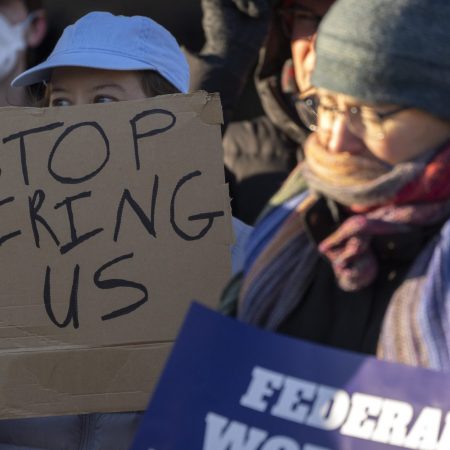How soon will prices rise as a result of President Trump’s reciprocal tariffs?
By CHRISTOPHER RUGABER and PAUL WISEMAN, Associated Press
WASHINGTON (AP) — After weeks of anticipation and speculation, President Donald Trump followed through on his reciprocal tariff threats by declaring on Wednesday a 10% baseline tax on imports from all countries and higher tariff rates on dozens of nations that run trade surpluses with the United States.
In announcing the reciprocal tariffs, Trump was fulfilling a key campaign promise by raising U.S. taxes on foreign goods to narrow the gap with the tariffs the White House says other countries unfairly impose on U.S. products.
“Reciprocal means ‘they do it to us and we do it to them,’” the president said from the White House Rose Garden on Wednesday.
Trump’s higher rates would hit foreign entities that sell more goods to the United States than they buy. But economists don’t share Trump’s enthusiasm for tariffs since they’re a tax on importers that usually get passed on to consumers. It’s possible, however, that the reciprocal tariffs could bring other countries to the table and get them to lower their own import taxes.
The Associated Press asked for your questions about reciprocal tariffs. Here are a few of them, along with our answers:
Do U.S.-collected tariffs go into the General Revenue Fund? Can Trump withdraw money from that fund without oversight?
Tariffs are taxes on imports, collected when foreign goods cross the U.S. border by the Customs and Border Protection agency. The money — about $80 billion last year — goes to the U.S. Treasury to help pay the federal government’s expenses. Congress has authority to say how the money will be spent.
Trump — largely supported by Republican lawmakers who control the U.S. Senate and House of Representatives — wants to use increased tariff revenue to finance tax cuts that analysts say would disproportionately benefit the wealthy. Specifically, they want to extend tax cuts passed in Trump’s first term and largely set to expire at the end of 2025. The Tax Foundation, a nonpartisan think tank in Washington, has found that extending Trump’s tax cuts would reduce federal revenue by $4.5 trillion from 2025 to 2034.
Trump wants higher tariffs to help offset the lower tax collections. Another think tank, the Tax Policy Center, has said that extending the 2017 tax cuts would deliver continued tax relief to Americans at all income levels, “but higher-income households would receive a larger benefit.’’
How soon will prices rise as a result of the tariff policy?
It depends on how businesses both in the United States and overseas respond, but consumers could see overall prices rising within a month or two of tariffs being imposed. For some products, such as produce from Mexico, prices could rise much more quickly after the tariffs take effect.
Some U.S. retailers and other importers may eat part of the cost of the tariff, and overseas exporters may reduce their prices to offset the extra duties. But for many businesses, the tariffs Trump announced Wednesday — such as 20% on imports from Europe — will be too large to swallow on their own.
Companies may also use the tariffs as an excuse to raise prices. When Trump slapped duties on washing machines in 2018, studies later showed that retailers raised prices on both washers and dryers, even though there were no new duties on dryers.
A key question in the coming months is whether something similar will happen again. Economists worry that consumers, having just lived through the biggest inflationary spike in four decades, are more accustomed to rising prices than they were before the pandemic.
Yet there are also signs that Americans, put off by the rise in the cost of living, are less willing to accept price increases and will simply cut back on their purchases. That could discourage businesses from raising prices by much.
What is the limit of the executive branch’s power to implement tariffs? Does Congress not play any role?
The U.S. Constitution grants the power to set tariffs to Congress. But over the years, Congress has delegated those powers to the president through several different laws. Those laws specify the circumstances under which the White House can impose tariffs, which are typically limited to cases where imports threaten national security or are severely harming a specific industry.
In the past, presidents generally imposed tariffs only after carrying out public hearings to determine if certain imports met those criteria. Trump followed those steps when imposing tariffs in his first term.
In his second term, however, Trump has sought to use emergency powers set out in a 1977 law to impose tariffs in a more ad hoc fashion. Trump has said, for example, that fentanyl flowing in from Canada and Mexico constitute a national emergency and has used that pretext to impose 25% duties on goods from both countries.
Congress can seek to cancel an emergency that a president declares, and Sen. Tim Kaine, a Democrat from Virginia, has proposed to do just that regarding Canada. That legislation could pass the Senate but would likely die in the House. Other bills in Congress that would also limit the president’s authority to set tariffs face tough odds for passage as well.
What tariffs are other countries charging on US goods?
U.S. tariffs are generally lower than those charged by other countries. The average U.S. tariff, weighted to reflect goods that are actually traded, is just 2.2% for the United States, versus the European Union’s 2.7%, China’s 3% and India’s 12%, according to the World Trade Organization.
Other countries also tend to do more than the United States to protect their farmers with high tariffs. The U.S. trade-weighted tariff on farm goods, for example, is 4%, compared to the EU’s 8.4%, Japan’s 12.6%, China’s 13.1% and India’s 65%. (The WTO numbers don’t count Trump’s recent flurry of import taxes or tariffs between countries that have entered into their own free trade agreements, such as the U.S.-Mexico-Canada Agreement that allows many goods to cross North American borders duty free.)
Previous U.S. administrations agreed to the tariffs that Trump now calls unjust. They were the result of a long negotiation between 1986 to 1994 — the so-called Uruguay Round — that ended in a trade pact signed by 123 countries and has formed the basis of the global trading system for nearly four decades.




























